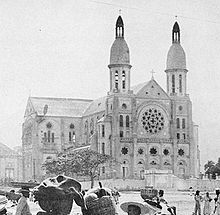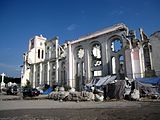Cathedral of Our Lady of the Assumption, Port-au-Prince
| Cathedral of Our Lady of the Assumption | |
|---|---|
 Cathedral before 1924. | |
| Religion | |
| Affiliation | Catholic Church |
| District | Archdiocese of Port-au-Prince |
| Rite | Roman Rite |
| Leadership | Mgr Guire Poulard, Archbishop of Port-au-Prince |
| Year consecrated | 1928 |
| Status | Destroyed (2010) |
| Location | |
| Location | Port-au-Prince, Haiti |
| Geographic coordinates | 18°32′56.6″N 72°20′19″W / 18.549056°N 72.33861°W |
| Architecture | |
| Type | Cathedral |
| Groundbreaking | 1884 |
| Completed | 1914 |
The Cathedral of Our Lady of the Assumption (French: Cathédrale Notre-Dame de L'Assomption), often called Port-au-Prince Cathedral (French: Cathédrale de Port-au-Prince), was a cathedral in Port-au-Prince, Haiti. Built between 1884 and 1914, it was dedicated on December 13, 1928, and became the cathedral church of the Roman Catholic Archdiocese of Port-au-Prince.[1] The cathedral was destroyed in during the devastating 12 January 2010 Haiti earthquake.
Before its destruction, the cupola of the north tower of the cathedral served as the front lighthouse of a pair, guiding mariners into Port-au-Prince harbor.[2]
Destruction
[edit]The roof and the towers flanking the main entrance collapsed in the 2010 earthquake, although the lower parts of the walls remain standing.[3][4] The earthquake also destroyed the nunciature and the archdiocesan offices, killing Archbishop Joseph Serge Miot instantly[5] and Vicar General Charles Benoit later.[6][7]
-
Remnants of the cathedral after its collapse. The aerial photo was taken 2 days after the earthquake of Tuesday, 12 January 2010.
-
Remnants of the cathedral after its collapse.
-
Interior of the cathedral after its collapse.
Reconstruction
[edit]In March 2012, the Archdiocese of Port-au-Prince, in collaboration with Faith & Form magazine and the Institute for the Safeguarding of National Heritage (ISPAN), a Haitian-government institution, launched an international design competition inviting the architects from all over the world to submit ideas that would inform the reconstruction of the cathedral.
Puerto Rican architect Segundo Cardona, FAIA from SCF Architects won the competition. He proposed to integrate and frame the facade of the old building, which survived the earthquake, with two new concrete towers, while the old nave, whose pillars also partially survived, will be transformed into a covered courtyard. The religious ceremonies will take place at the level of the current transept under a vast room surmounted by a dome, underneath which will be the altar. The new design allows for a capacity of 1,200 faithful (capacity which can be raised to 600 additional persons thanks to the use of the covered yard). The interior of the new cathedral will be marked by the creative and abundant use of natural light, as the supply of electricity in Port-au-Prince is intermittent and expensive.
"The winning design — [is] a modern interpretation of the traditional architecture of a cathedral [...]. Cardona’s other significant works include the Coliseum of San Juan and the Puerto Rico Pavilion built for the 1992 World Expo in Seville, Spain."[8][9]
The building remains in ruins as of 2021.[10]
See also
[edit]References
[edit]- ^ "The Construction and the Deterioration of a National Treasure: Port-au-Prince Cathedral". Retrieved 2010-01-14.
- ^ Rowlett, Russ. "Lighthouses of Haiti". The Lighthouse Directory. University of North Carolina at Chapel Hill.
- ^ Deacon Keith Fournier (13 January 2010). "Breaking News: Devastating 7.0 Earthquake Hammers Beleagured [sic] Island Nation of Haiti". Catholic Online. Archived from the original on 11 May 2011. Retrieved 13 January 2010.
- ^ "Haiti Archbishop Killed in Quake as Churches, Cathedral Reduced to Rubble". Fox News. 13 January 2010. Archived from the original on 16 January 2010. Retrieved 13 January 2010.
- ^ "Exclusive: Papal nuncio gives dramatic report on Church in Haiti". Denver, Colorado: Catholic News Agency. 2010-01-14. Retrieved 2010-01-16.
- ^ Wilkinson, Tracy (2010-01-16). "Searching among a Haitian cathedral's ruins". Los Angeles Times. Los Angeles, California. Retrieved 2010-01-17.
Father Charles Benoit, buried under a collapsed four-story building that contained his residence, managed to get a cellular telephone call out to Francois Voleile, a lifelong parishioner, two days ago. He said he was unharmed and had water and juice but no way out.
- ^ Robles, Frances (2010-01-17). "Bishops are among the few to get a proper burial". Miami Herald. Miami, Florida. Retrieved 2010-01-17.
- ^ Edgerton, Anna (20 December 2012). "Puerto Rican team wins design competition for Haitian Cathedral". Miami Herald. Retrieved 20 February 2018.
- ^ "Arquitecto boricua reconstruirá la catedral de Puerto Príncipe". El Nuevo Día. GFR Media. Retrieved 5 April 2018.
Segundo Cardona y su equipo se impusieron en un concurso en el que participaron 130 proyectos de todo el mundo
- ^ Sautreuil, Pierre (2020-01-12). "Notre-Dame de Port-au-Prince, cathédrale martyre de Haïti". Le Figaro.fr (in French). Retrieved 2020-07-21.
External links
[edit]- Vander Brug, Brian. "Panorama: Destruction at Notre Dame Cathedral of Port-au-Prince (Click and drag within the image to navigate. The panorama was created by combining multiple photographs taken consecutively.)". Los Angeles Times. Retrieved 2010-01-21.
- The Construction and the Deterioration of a National Treasure: Port-au-Prince Cathedral
- Image of the destroyed cathedral



